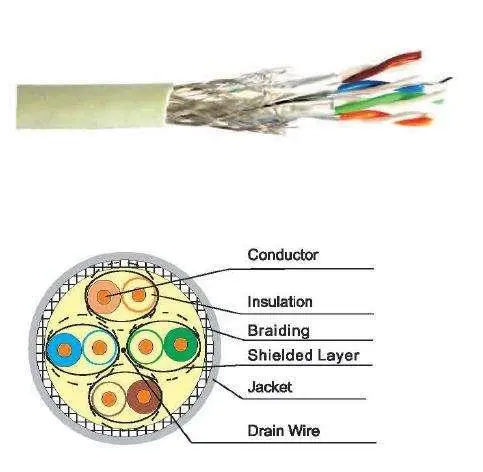What are the characteristics and uses of Cat7 cables?
Today, the demand for faster Internet and data transmission speed in various commercial and industrial fields is increasing. The Cat7 cable is designed to support higher frequency signals than Cat5e and Cat6 cables.
Cat7 cable is a shielded twisted pair cable used for 1Gbps or higher speed Ethernet based high-speed computer networks directly connected to servers, switches, and computer networks. ISO/IEC 11801:2002 Level F specification defines and regulates it. Cat7 Ethernet cable types and speeds are backward compatible with Cat6, Cat5/e cabling standards, and Cat5/e devices.
What is the purpose of CAT7 cables?
Cat7 cable is a high-end jumper used to provide the core infrastructure for wired Gigabit Ethernet settings. Some common examples include:
Ethernet cable
Cat7 Ethernet cable (LAN cable) is used to connect modems, hubs, and individual computers on networks of various shapes and sizes.
Commercial and Industrial Applications
Cat7 cables can withstand various hazards, including extreme temperatures, UV/moisture exposure, and direct contact with different chemicals and oils.
Home applications
In addition to audiophile game settings, Cat7 cables are increasingly popular among home users in various Cat7 LAN cable networks and connection settings.
Characteristics and specifications of Cat7 cables
ISO/IEC 11801:2002 specifies Cat7 Ethernet cable specifications. Due to the fact that Cat7 cables are sometimes referred to as ISOF class cables, the Cat7 cable specification is also known as the F class standard.
1. Seven types of line transmission rates
The design purpose of Cat7 cable is to support 10Gbps Ethernet, but laboratory tests have shown that it can transmit up to 40Gbps of data within 50 meters, and even 100Gbps of data at 15 meters.
Compared to previous versions, in terms of raw performance, theoretically it is six times that of Cat5e (100MHz) and 2.4 times that of Cat6 (250MHz).
2. Seven types of network cable specifications
In 2002, the Cat7 cabling standard was approved, allowing 10 Gigabit Ethernet Cat7 cables for copper wiring. The maximum length of Cat7 is the same as Cat5e, Cat6, and Cat6A, with a maximum distance of 328 feet (100 meters).
Class 7 cables have four pairs of shielded twisted pair copper wires and an overall cable shielding layer. This helps it meet strict standards for signal loss over distance and ensures that Cat7 cables can better prevent performance degradation caused by crosstalk and electromagnetic interference (EMI).
To find products and services more accurately, please try entering keywords for search.
For more product and service content, please contact us and send an email to sales@dimud.com.
We sincerely look forward to connecting with you!



